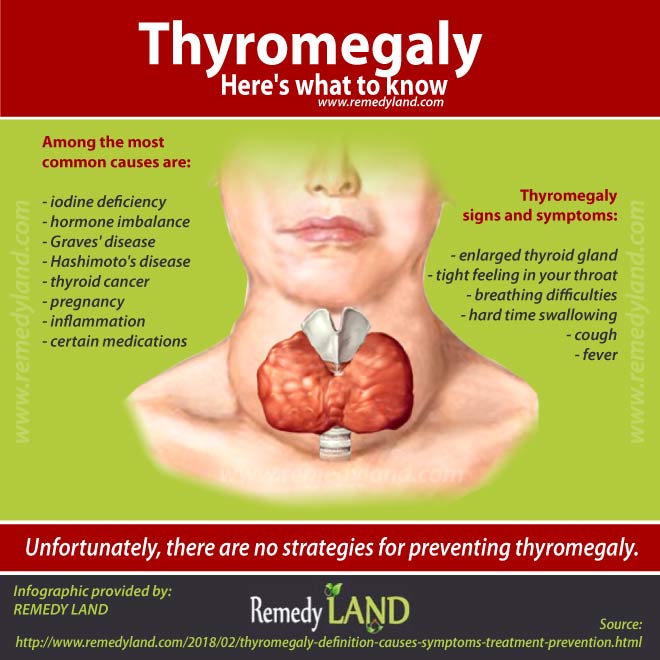What is thyromegaly?
Thyromegaly is a swelling in the neck, usually benign in nature, resulting from an abnormal enlargement of thyroid gland that is not functioning properly. Thyroid is a butterfly-shaped gland that secretes hormones and regulates bodily functions. Thyroid is located at the base of the front side of the neck and can become very large to the point that it can be easily be seen as a mass in the neck. Thyromegaly indicates there is an imbalance in hormone production of a thyroid gland.
Page Contents
What causes thyromegaly?
There are a number of factors that may cause thyromegaly, but the most common cause today is an increase in thyroid stimulating hormone, and an iodine deficiency in the diet in the past.
Among the most common causes are:
- iodine deficiency
- hormone imbalance
- Graves’ disease
- Hashimoto’s disease
- thyroid cancer
- pregnancy
- inflammation
- certain medications
Iodine deficiency
In the past, foods such as cabbage, cauliflower, peanuts … and spinach ware interfering with your thyroid’s ability to process iodide, and that was the main cause of thyromegaly. But, today when the use of iodized salt is common and the iodine is added to other foods as well, an iodine deficiency is rarely the cause.

Hormone imbalance
The most common causes of thyromegaly are hyperthyroidism or too much thyroid hormones, and hypothyroidism or underproduction of thyroid stimulating hormones that develop in the thyroid gland itself. These hormones control the way every cell in the body uses energy.
Graves’ disease
Another common thyromegaly cause is an autoimmune disease characterized by overactivity of the entire thyroid gland, known as Graves’ disease. In Graves’ disease circulating autoantibodies mistakenly attack thyroid gland, causing it to produce too much thyroid hormones.
Hashimoto’s disease
Hashimoto’s disease is a common cause of thyromegaly. This autoimmune disorder mounts an immune reaction against thyroid gland and gradually destroys it. With time thyroid gland becomes more damaged and has less ability to adequately supply thyroid hormones.
Thyroid cancer
In addition to the common thyromegaly causes, there are less common ones like thyroid cancer. This rare type of cancer develops from the tissues of the thyroid gland. The biopsy of a thyroid nodule determines is the nodule cancerous or benign.
Pregnancy
It’s not exactly common to develop thyromegaly during pregnancy, but sometimes during this joyful time thyroid goes haywire and become slightly enlarged. Thyromegaly in pregnancy can affect the health of the mother and child but it can be easily treated.
Inflammation
Inflammation of the thyroid gland known as thyroiditis can cause swelling in the thyroid. This inflammation can be silent and non-painful and sometimes patients are not aware that the thyroid gland is inflamed.
Thyromegaly induced by certain medications
Some medical treatments affect thyroid gland function and can cause hyperthyroidism or hypothyroidism in susceptible individuals. Those medications usually contain excess amounts of iodine.
What are thyromegaly signs and symptoms?
Thyromegaly is not always showing signs and symptoms, but when they occur they may include:
- enlarged thyroid gland
- tight feeling in your throat
- breathing difficulties
- hard time swallowing
- cough
- fever
Swollen thyroid gland
The most usual and obvious symptom is a visible swelling at the base of your neck. The size of enlargement may range from a single small nodule to a large mass.
Tightness in the esophagus area
An enlarged thyroid gland can cause throat to feel tight or you feel a lump in the neck under the skin. This tightness may cause panic attacks in some patients.
Breathing difficulties due to thyromegaly
Breathing problems such as shallow breathing or constant pressure in lungs are common but overlooked thyromegaly signs caused by enlarged thyroid gland that puts pressure on the windpipe.
Swallowing difficulties
Sometimes thyroid nodules in the neck may become large enough to make it difficult to swallow food or it feels like it goes down very slowly. Patients may even choke on their food or liquid when trying to swallow.
Frequent coughing
If the chronic cough is not due to a cold or other issue it might be caused by thyromegaly, especially if the frequent coughing is need it to clear up your throat.
Thyromegaly caused fever
Fever is often present in thyromegaly and it is one of the hallmark signs of thyroid storm. This is a life-threatening condition for some patients because thyromegaly caused fever can be quite high.
What are thyromegaly treatments?
Thyromegaly is treated according to the cause and depends on the size of the enlargement, signs and symptoms.
- In case the enlargement of thyroid gland is small, doctor may suggest a wait-and-see approach.
- In case of iodine deficiency, small doses of Lugol’s iodine or potassium iodine are the best solution.
- For moderate-sized thyroid gland enlargement, your doctor may suggest medication, a thyroid hormone in the form of a pill to stop further enlargement of thyroid gland.
- For inflammation your doctor may suggest medication.
- For vary large thyroid gland that causes difficulty breathing or swallowing, surgical removal might be the right solution.
- Surgery is also the best way to treat thyroid cancer. After surgery you might need medication, depending on the amount of thyroid removed.
- In some cases, radioactive iodine can be used to treat thyromegaly especially if the thyroid gland is producing too much thyroid hormone.
Lifestyle and prevention
Unfortunately, there are no strategies for preventing thyromegaly, but if you suspect you have a thyromegaly and have a family history of thyroid diseases, there are some lifestyle changes that can keep your thyroid on track, and those are:
- the right diet
- stop smoking
- watch out for fluoride
- say NO to starvation diets
- protect yourself from X-rays
- stay away for excessive exercise
- keep an eye on blood-work
- avoid environmental toxins
- treat yourself in moderation

